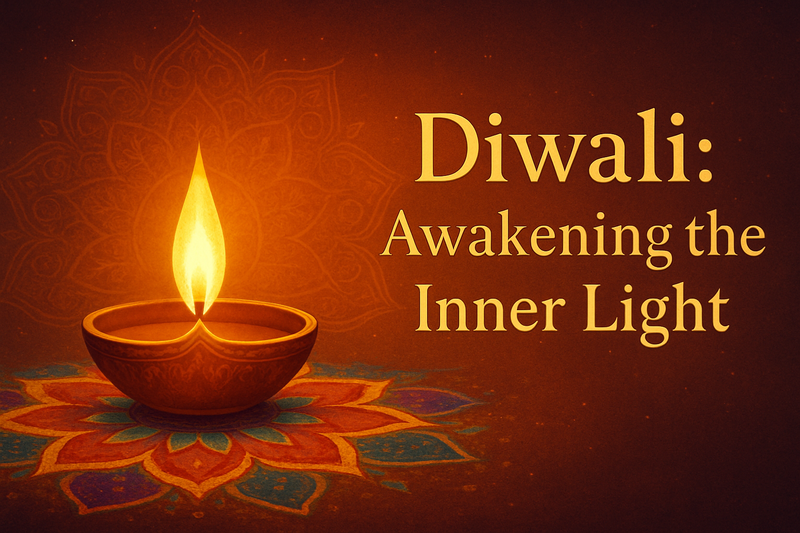
Diwali, the radiant festival of lights, has just passed, leaving behind the soft glow of lamps, the sweetness of togetherness, and the fragrance of devotion still lingering in the air. Across India and beyond, homes shone bright, prayers were offered to Goddess Lakshmi, and hearts overflowed with gratitude. Even as the diyas fade, the essence of Diwali continues to illuminate our minds — reminding us that its true meaning lies not only in the outer celebration, but in the awakening of the light within.
The Many Stories of Light
Across India’s diverse spiritual traditions, Diwali holds multiple meanings, and each one of them carry the essence of renewal and liberation.
In North India, it marks Lord Rama’s return to Ayodhya after fourteen years of exile and the defeat of Ravana – the triumph of dharma over adharma, righteousness over ego and deceit.
In South India, it commemorates Lord Krishna’s victory over the demon Narakasura, symbolising the destruction of ignorance.
In Western India, it is believed that Vishnu freed King Bali, teaching that humility is the true gateway to freedom.
For the Jain community, Diwali marks the day Lord Mahavira attains nirvana or samadhi, the supreme light of liberation.
And for Sikhs, it coincides with Bandi Chhor Divas, the day Guru Hargobind was released from captivity, representing freedom and divine grace.
Different cultures carry different stories and heroes, yet one message resonates through them all: when darkness, ignorance, and bondage end, light, wisdom, and freedom arise.
The Yogic and Vedic Significance of Diwali
The symbolism of light and darkness is central not only to Diwali but to the philosophy of yoga itself.
In the Upanishads, light (jyoti) is not merely physical. It represents consciousness – the inner awareness that dispels ignorance (avidya). The ancient prayer from the Bṛhadāraṇyaka Upanishad beautifully encapsulates this idea:
Tamaso mā jyotir gamaya
“Lead me from darkness to light.”
Just as lighting a lamp removes physical darkness, the practice of yoga removes the inner darkness of confusion, attachment, and false identity, thereby facilitating clarity and authenticity.
In Patanjali’s Yoga Sutras, Avidya is described as the root of all suffering – mistaking the temporary for the eternal, the impure for the pure, the self for the non-self.
When we engage in asana, pranayama, and dhyana, we are, in essence, cleansing the layers that veil our inner light and returning to the pure awareness that is always shining within.
Goddess Lakshmi and Inner Prosperity
During Diwali, devotees invite Goddess Lakshmi into their homes, seeking wealth, harmony, and abundance. Yet the deeper yogic interpretation of Goddess Lakshmi goes beyond material prosperity. She represents inner abundance, qualities like clarity, compassion, peace, and contentment.
In yogic terms, this is the cultivation of sattva: the pure, luminous quality of being that brings balance and harmony to our inner world. When our mind becomes still and clear, we naturally attract outer prosperity, not as an accident, but as a reflection of inner alignment.
Every Diwali Ritual is a Yogic Act
Each Diwali ritual can be seen as a mirror of yogic practice:
Cleaning the home represents Saucha, the niyama of purity, clearing both external and internal clutter.
Lighting diyas awakens the inner Agni (fire), the energy of transformation.
Sharing sweets and greetings embodies Maitri (friendliness) and Seva (service), essential attitudes of yoga.
Thus, Diwali is not only a social celebration but also a living sadhana, a practice of aligning our outer and inner worlds.
Diwali: An Inner Journey
If we look inward, Diwali can be experienced as a five-step inner journey:
1. Cleaning: Releasing negativity and judgment.
2. Lighting: Awakening consciousness through mindfulness.
3. Worship: Cultivating gratitude to the divine within.
4. Celebration: Rejoicing in our connection with life.
5. Sharing: Extending light and kindness to others.
The ultimate goal is to realise that the light we seek outside is already burning steadily within.
As the lamps of Diwali slowly fade, may their light continue to glow within us as clarity, compassion, and awareness. The festival may have passed, but its essence endures in every act of kindness, every moment of stillness, and every spark of understanding we nurture. May the radiance we lit in our homes now guide our hearts towards peace and truth.
“When the lamp of the heart is lit, the whole universe glows with divine light.”
Wishing you all continued light, joy, and serenity in the days following Diwali.
